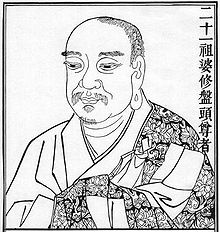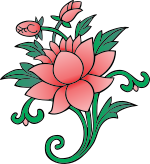
Back فاسوباندو Arabic Vasubandhu AST Васубандху Bulgarian বসুবন্ধু Bengali/Bangla སློབ་དཔོན་དབྱིག་གཉེན་ Tibetan Vasubandhu Catalan Vasubandhu Czech Vasubandhu German Vasubanduo Esperanto Vasubandhu Spanish
Vasubandhu | |
|---|---|
 Monk and Yogacara philosopher Vasubandhu as Chan patriarch in a Chinese illustration. | |
| Occupation | Buddhist monk |
| Known for | Cofounder of the Yogacara philosophical school |
| Relatives | Asanga (half-[citation needed]brother) |
| Part of a series on |
| Mahāyāna Buddhism |
|---|
 |
Vasubandhu (traditional Chinese: 世親; ; pinyin: Shìqīn; Tibetan: དབྱིག་གཉེན་ Wylie: dbyig gnyen; fl. 4th to 5th century CE) was an influential Indian Buddhist monk and scholar.[1] He was a philosopher who wrote commentary on the Abhidharma, from the perspectives of the Sarvastivada and Sautrāntika schools. After his conversion to Mahayana Buddhism, along with his half-[citation needed]brother, Asanga, he was also one of the main founders of the Yogacara school.
Vasubandhu's Abhidharmakośakārikā ("Commentary on the Treasury of the Abhidharma") is widely used in Tibetan and East Asian Buddhism, as the major source for non-Mahayana Abhidharma philosophy. His philosophical verse works set forth the standard for the Indian Yogacara metaphysics of "appearance only" (vijñapti-mātra), which has been described as a form of "epistemological idealism", phenomenology[2] and close to Immanuel Kant's transcendental idealism.[3] Apart from this, he wrote several commentaries, works on logic, argumentation and devotional poetry.
Vasubandhu is one of the most influential thinkers in the Indian Buddhist philosophical tradition. Because of their association with Nalanda university, Vasubandhu and Asanga are amongst the so-called Seventeen Nalanda Masters.[4][5] In Jōdo Shinshū, he is considered the Second Patriarch; in Chan Buddhism, he is the 21st Patriarch.
- ^ Kritzer, Robert. "Vasubandhu". Brill's Encyclopedia of Buddhism Online.
- ^ Lusthaus, Dan (2002). Buddhist Phenomenology: A Philosophical Investigation of Yogācāra Philosophy and the Ch'eng Wei-shih lun. New York, NY: Routledge.
- ^ Gold, Jonathan C. (2015). ""Vasubandhu"". In Zalta, Edward N. (ed.). The Stanford Encyclopedia of Philosophy. Metaphysics Research Lab, Stanford University.
- ^ Niraj Kumar; George van Driem; Phunchok Stobdan (18 November 2020). Himalayan Bridge. KW. pp. 253–255. ISBN 978-1-00-021549-6.
- ^ "The Seventeen Pandits of Nalanda Monastery". Foundation for the Preservation of the Mahayana Tradition.